Jamaica is leading the way in sustainable architecture and eco-friendly construction projects with its top green buildings. As part of its Vision 2030 plan, Jamaica is committed to developing sustainable tourism and promoting responsible stays. These efforts have resulted in the creation of impressive eco-friendly buildings throughout the country.
Key Takeaways:
- Jamaica is dedicated to developing sustainable tourism and promoting responsible stays.
- The country boasts top green buildings that prioritize eco-friendly construction practices.
- Green buildings in Jamaica utilize features such as solar power, wind energy, and water recycling.
- These buildings support local communities, fund environmental causes, and contribute to the preservation of Jamaica’s cultural heritage.
- Jamaica’s green buildings exemplify the country’s commitment to sustainable development and environmentally friendly practices.
Digicel Global Headquarters, Kingston
The Digicel Global Headquarters in Kingston is a prime example of sustainable architecture, utilizing green building materials and practices. As the telecommunications giant constructs its global headquarters, it is committed to creating the greenest building in the Caribbean.
Key features of the Digicel Global Headquarters include the use of solar power, solar cooling, and wind power to minimize its environmental impact. By harnessing renewable energy sources, this building will significantly reduce its carbon footprint and reliance on traditional energy sources.
Additionally, the headquarters will incorporate other environmentally friendly elements, such as rainwater harvesting systems and energy-efficient lighting. By embracing these green building practices, Digicel is setting a new standard for sustainable construction in Jamaica and the wider region.
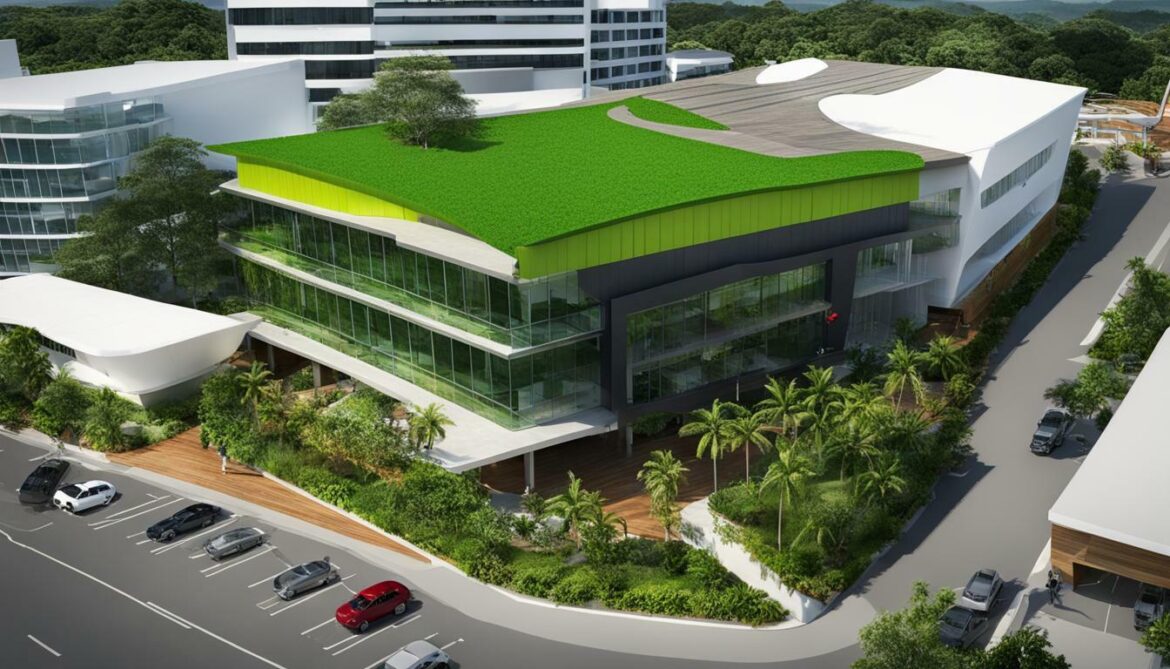
| Green Building Features |
Description |
| Solar Power |
The building will utilize solar panels to generate clean and renewable electricity. |
| Solar Cooling |
Solar energy will power the building’s cooling systems, reducing its energy consumption and reliance on traditional air conditioning. |
| Wind Power |
Wind turbines will be installed to harness the power of the wind and generate additional renewable energy for the headquarters. |
| Rainwater Harvesting |
The building will have systems in place to collect rainwater for non-potable uses, such as irrigation and toilet flushing. |
| Energy-Efficient Lighting |
LED lighting fixtures will be used throughout the headquarters to minimize energy consumption and reduce greenhouse gas emissions. |
The Digicel Global Headquarters in Kingston demonstrates how sustainable architecture can be integrated into contemporary construction projects, showcasing the possibilities for a greener future in Jamaica and beyond.
Jakes, Treasure Beach, St. Elizabeth
Jakes in Treasure Beach, St. Elizabeth, exemplifies sustainable development in Jamaica and showcases environmentally-friendly architecture. This boutique hotel goes above and beyond to prioritize the community and the planet. Believing in the power of education, Jakes has funded equipment for the local school, enabling children to thrive in a modern learning environment. Additionally, the hotel has built a community sports park, providing a safe and accessible space for recreational activities.
With a deep commitment to the environment, Jakes supports local fishermen and farmers through tourism initiatives, boosting the local economy and promoting sustainable livelihoods. The hotel’s dedication to the protection of Jamaica’s natural resources is evident in its support of the Galleon Beach Marine Sanctuary, contributing to the preservation of marine life and the restoration of coral reefs.
At Jakes, sustainable practices are an integral part of their ethos. The hotel embraces environmentally-friendly architecture by incorporating renewable energy sources, such as solar power, and implementing energy-efficient technologies. Their responsible waste management system includes recycling and composting, minimizing the environmental impact. Jakes’ approach to sustainable development sets an example for the hospitality industry and highlights the importance of preserving Jamaica’s natural beauty for future generations.
| Key Features of Jakes |
Impact |
| Support for local community |
Enhances education and livelihood opportunities |
| Environmental initiatives |
Preserves marine life and promotes sustainable practices |
| Sustainable architecture |
Utilizes renewable energy and efficient technologies |
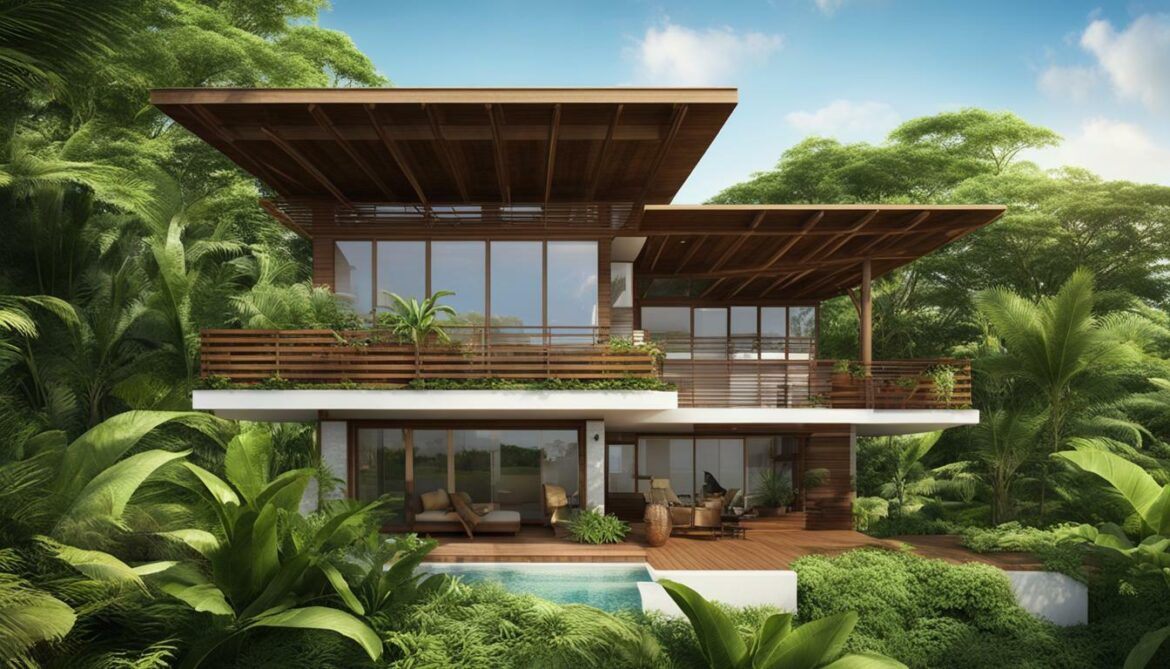
The efforts of Jakes in Treasure Beach, St. Elizabeth, contribute to the overall vision of sustainable tourism in Jamaica. By prioritizing community, environment, and responsible practices, Jakes sets a benchmark for other establishments in the country. Through initiatives that showcase environmentally-friendly architecture and support sustainable development in Jamaica, Jakes exemplifies the essence of responsible tourism.
Jamaica Inn, Ocho Rios, Saint Ann
Jamaica Inn in Ocho Rios, Saint Ann, is renowned for its energy-efficient buildings and green building practices, while also actively supporting marine conservation projects. This luxurious hotel is committed to minimizing its carbon footprint and has implemented various sustainable initiatives.
Energy efficiency is a top priority at Jamaica Inn. The hotel utilizes solar energy to power its operations, reducing reliance on traditional energy sources. By harnessing the power of the sun, Jamaica Inn significantly reduces its greenhouse gas emissions and contributes to a cleaner environment.
The hotel also implements various green building practices, such as utilizing eco-friendly construction materials and implementing energy-saving measures. This includes the use of energy-efficient appliances, LED lighting, and advanced insulation techniques to minimize energy consumption.
Furthermore, Jamaica Inn actively supports marine conservation projects. The hotel is located near marine-protected areas and works closely with local organizations to protect and preserve the delicate marine ecosystem. The hotel’s commitment to sustainable tourism extends beyond its walls, as it actively contributes to marine life preservation and the overall well-being of the surrounding environment.
| Energy-Efficient Buildings |
Green Building Practices |
| – Utilizes solar energy |
– Utilizes eco-friendly construction materials |
| – Reduces reliance on traditional energy sources |
– Implements energy-saving measures |
| – Minimizes greenhouse gas emissions |
– Uses energy-efficient appliances and LED lighting |
| – Contributes to a cleaner environment |
– Implements advanced insulation techniques |
Jamaica Inn’s commitment to energy efficiency and green building practices sets a prime example for sustainable tourism. By prioritizing environmental responsibility, the hotel not only provides guests with a luxurious and unforgettable experience but also contributes to the long-term well-being of Jamaica’s natural resources and cultural heritage.
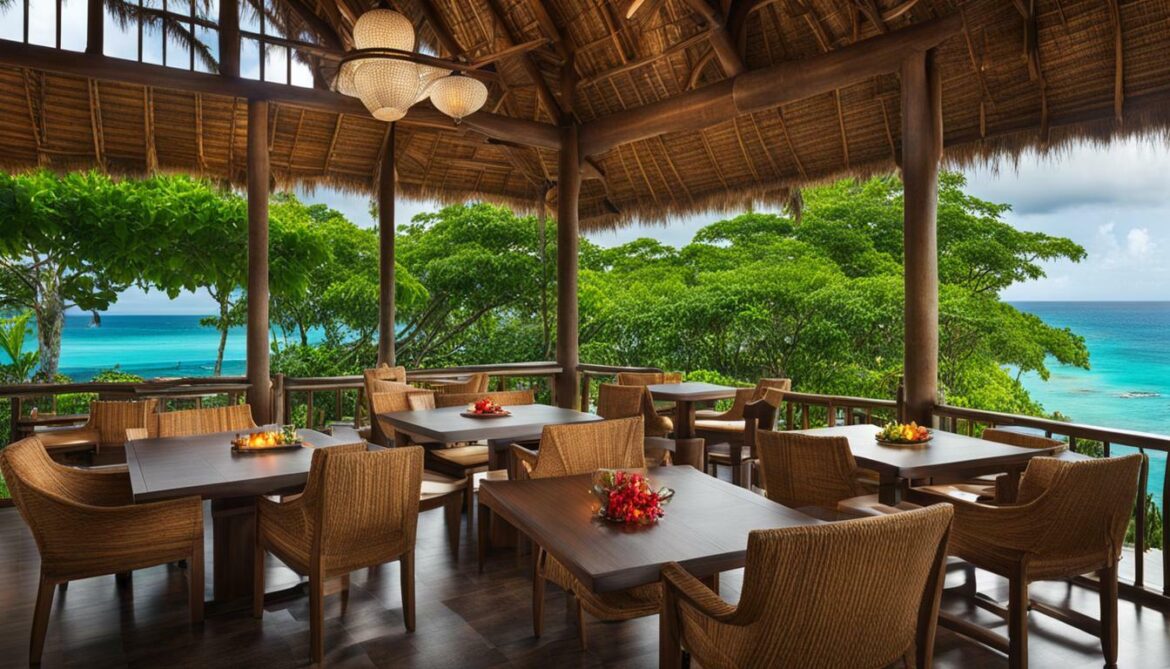
Rockhouse in Negril, Westmoreland, promotes sustainable living in Jamaica through its various community initiatives and notable green construction projects. This eco-friendly hotel is renowned for its commitment to environmental conservation and social responsibility. It has implemented several practices to minimize its ecological footprint and contribute positively to the local community.
One of Rockhouse’s standout features is its organic farm, where fresh produce is grown to support the hotel’s restaurants. By utilizing sustainable farming techniques, the hotel reduces its reliance on imported food and supports the local agricultural industry. Additionally, Rockhouse has implemented comprehensive water-saving measures, including rainwater harvesting and efficient irrigation systems, to minimize water waste and preserve Jamaica’s precious resources.
Rockhouse’s dedication to community initiatives is evident through its partnership with the Rockhouse Foundation. This non-profit organization has played a vital role in the construction of schools in western Jamaica, providing educational infrastructure and resources to underprivileged children. Through these efforts, Rockhouse aims to empower communities and create a brighter future for Jamaica’s youth.
| Key Initiatives of Rockhouse, Negril, Westmoreland |
Benefits |
| Organic Farming |
Reduces reliance on imported food, supports local agriculture |
| Water-saving measures |
Preserves Jamaica’s water resources |
| Partnership with Rockhouse Foundation |
Supports educational infrastructure and resources |
Through its sustainable practices and community-focused initiatives, Rockhouse sets an example for other establishments in Jamaica and beyond. It demonstrates that sustainable tourism and responsible construction can coexist, benefiting both the environment and the local community. By choosing to stay at Rockhouse, guests not only enjoy a unique and eco-friendly experience but also contribute to the preservation of Jamaica’s natural beauty and cultural heritage.
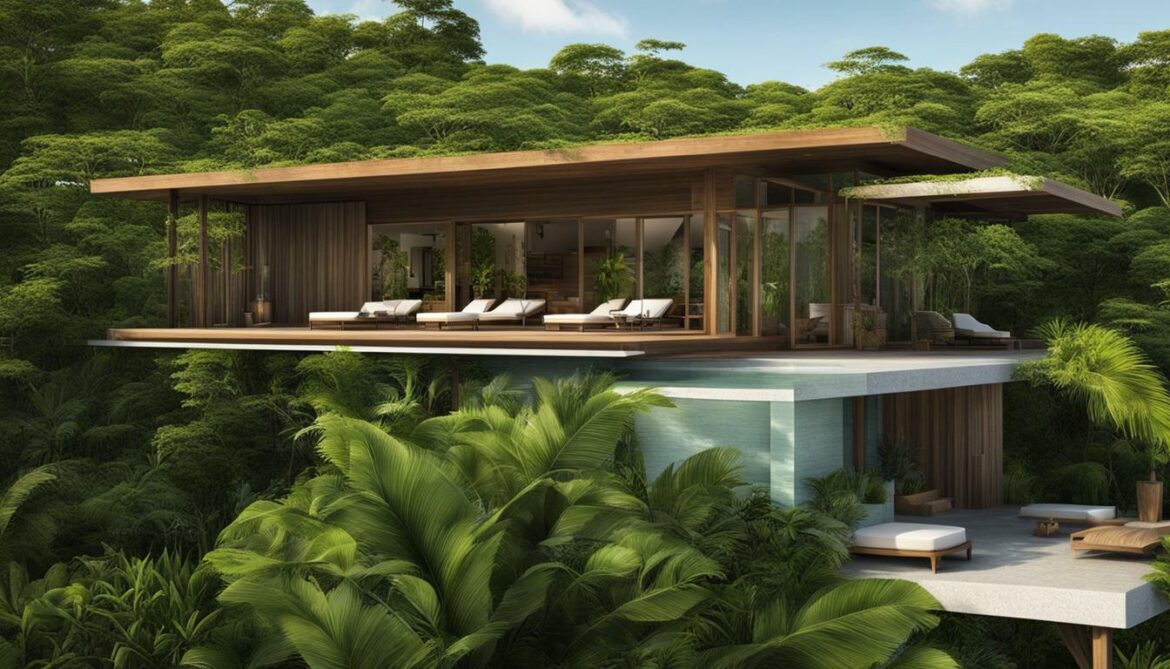
Jamaica’s top green buildings play a crucial role in promoting sustainable tourism and environmentally friendly practices, setting a precedent for the future of architecture in the country. With a commitment to eco-friendly and responsible stays, Jamaica is leading the way in developing sustainable tourism as part of its Vision 2030 plan.
One of the standout examples is the Digicel Global Headquarters in Kingston, which aims to be the greenest building in the Caribbean. Through the use of solar power, solar cooling, wind power, and other environmentally friendly features, Digicel is demonstrating its commitment to reducing its carbon footprint.
Another notable green building is Jakes, a boutique hotel in Treasure Beach, St. Elizabeth. Jakes not only prioritizes the well-being of its guests but also invests in the local community. From funding equipment for the local school to supporting local fishermen and farmers through tourism initiatives, Jakes showcases its dedication to sustainable development in Jamaica.
Jamaica Inn in Ocho Rios, Saint Ann, is deeply committed to environmental conservation. The hotel’s goal of becoming carbon neutral by 2025 is backed by its use of solar energy, eco-friendly chemicals, composting, and water recycling. Furthermore, Jamaica Inn actively supports marine-protected areas and turtle protection projects, highlighting its commitment to responsible tourism.
Rockhouse in Negril, Westmoreland, is another shining example of green architecture in Jamaica. The hotel’s low-impact design and extensive eco-friendly practices, such as composting and water-saving measures, reflect a sustainable approach. Additionally, through the Rockhouse Foundation, the hotel has contributed to the development of schools in western Jamaica, investing in education and community empowerment.
Great Huts in Port Antonio, Portland, is an eco-resort with a strong social conscience. In addition to its commitment to green solar energy, composting, and recycling, Great Huts funds a homeless shelter and promotes Jamaica’s cultural heritage through Afrocentric artwork and cultural activities. This eco-resort combines sustainable practices with social responsibility.
Sunset at the Palms in Negril, Westmoreland, stands out for its unique treehouse-style rooms and dedication to wildlife conservation. The hotel’s lush tropical gardens provide a serene environment, while safe pesticides, an organic herb garden, and food waste donations to local pig farmers showcase its commitment to sustainability. Recognized as the world’s first hotel to receive certification for environmentally sustainable tourism, Sunset at the Palms sets a high standard for eco-friendly accommodations.
These top green buildings in Jamaica demonstrate the country’s unwavering dedication to sustainable tourism and environmentally friendly practices. By combining innovative design, renewable energy sources, community engagement, and environmental stewardship, these buildings serve as beacons of sustainability, paving the way for a greener future in Jamaica’s architectural landscape.
FAQ
What are some of the top green buildings in Jamaica?
Some of the top green buildings in Jamaica include the Digicel Global Headquarters in Kingston, Jakes in Treasure Beach, Jamaica Inn in Ocho Rios, Rockhouse in Negril, Great Huts in Port Antonio, and Sunset at the Palms in Negril.
What sustainable features can be found in the Digicel Global Headquarters?
The Digicel Global Headquarters in Kingston utilizes solar power, solar cooling, wind power, and other environmentally friendly features.
How does Jakes in Treasure Beach support the local community and climate?
Jakes supports the local community by funding equipment for the local school, building a community sports park, and supporting local fishermen and farmers through tourism initiatives. It also funds environmental causes such as the Galleon Beach Marine Sanctuary.
What green practices does Jamaica Inn in Ocho Rios implement?
Jamaica Inn is deeply committed to sustainability and aims to become carbon neutral by 2025. It uses solar energy, eco-friendly chemicals, composting, and water recycling. It also supports marine-protected areas and turtle protection projects.
How does Rockhouse in Negril promote sustainable living?
Rockhouse in Negril promotes sustainable living through low-impact design and various eco-friendly practices. It has composting, an organic farm, water-saving measures, and community initiatives. The Rockhouse Foundation has also helped fund the building of schools in western Jamaica.
What sustainable initiatives can be found at Great Huts in Port Antonio?
Great Huts in Port Antonio uses green solar energy, composting, and recycling. It also has a strong social conscience and funds a homeless shelter. Additionally, it promotes Jamaica’s cultural heritage through Afrocentric artwork and cultural activities.
What wildlife and sustainability efforts does Sunset at the Palms in Negril focus on?
Sunset at the Palms in Negril is committed to wildlife and sustainability. It has treehouse-style rooms surrounded by lush tropical gardens and uses safe pesticides. The hotel also has an organic herb garden and donates food waste to local pig farmers. It was the world’s first hotel to receive certification for environmentally sustainable tourism.
Source Links











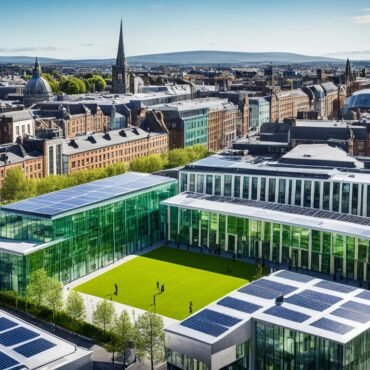
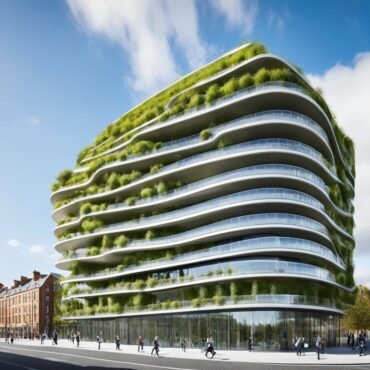




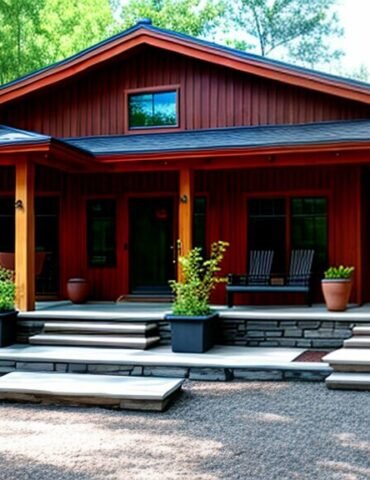

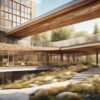


Post comments (0)